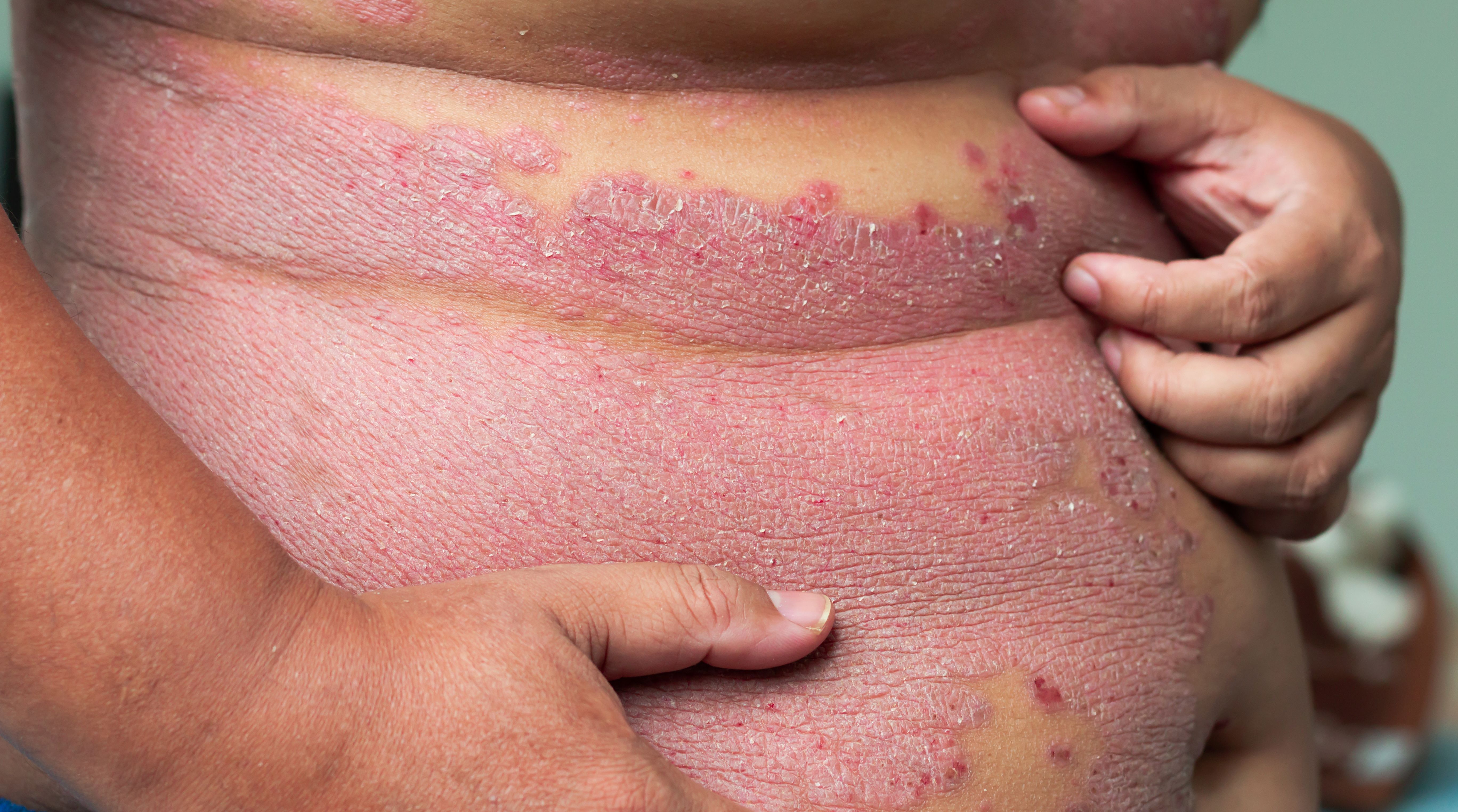- Case-Based Roundtable
- General Dermatology
- Eczema
- Chronic Hand Eczema
- Alopecia
- Aesthetics
- Vitiligo
- COVID-19
- Actinic Keratosis
- Precision Medicine and Biologics
- Rare Disease
- Wound Care
- Rosacea
- Psoriasis
- Psoriatic Arthritis
- Atopic Dermatitis
- Melasma
- NP and PA
- Skin Cancer
- Hidradenitis Suppurativa
- Drug Watch
- Pigmentary Disorders
- Acne
- Pediatric Dermatology
- Practice Management
- Prurigo Nodularis
- Buy-and-Bill
Article
Weight matters in psoriasis, psoriatic arthritis
Author(s):
Data shows obesity is prevalent among patients with psoriasis and psoriatic arthritis, but the exact role weight plays in contributing to psoriatic disease and its severity is still unknown. At a minimum, industry experts agree that addressing obesity can be vital in treating psoriatic disease.
Existing research and clinical care interventions have shown patients who lose weight do respond better to psoriasis treatment. (nikkikii - stock.adobe.com)

Dr. Lebwohl

Dr. Armstrong

Obesity has frequently been dubbed an epidemic in the United States and is credited with causing or contributing to a wide variety of other chronic ailments, including cardiovascular disease and osteoarthritis. However, it’s also a frequent comorbidity for another common set of connected conditions - psoriasis and psoriatic arthritis.
According to 2015-2016 Centers for Disease Control and Prevention statistics, obesity impacts approximately 93.3 million American adults. And, even though the exact incidence among individuals with psoriatic disease isn’t known, data shows obesity is prevalent in this patient population.
Despite its frequent occurrence, questions still exist about the role obesity plays in contributing to psoriatic disease and its severity. There’s also been growing discussion around whether weight loss and management can be an effective therapeutic avenue.
At a minimum, many industry experts agree addressing obesity can be a vital arrow in the quiver for treating psoriatic disease.
“Obesity is a very common comorbidity of psoriasis and psoriatic arthritis,” says Mark Lebwohl, M.D., dermatology professor at Icahn School of Medicine at Mount Sinai. “It has a negative impact on the response to therapies so that many therapies don’t work as well.”
In fact, he says, existing research and clinical care interventions have shown patients who lose weight do respond better to psoriasis treatment.
The impact of obesity
Obesity is known to cause low-grade inflammation. Fat cells produce pro-inflammatory mediators, such as tumor necrosis factor-α or interleukin 6, which can contribute to the inflammation associated with psoriasis and psoriatic arthritis.
“What we do know is that our adipose tissue - or fat - is not inert. The latest research has shown it’s actually endocrinologically active,” says April Armstrong, M.D., MPH, associate dean of clinical research at Keck School of Medicine at the University of Southern California, Los Angeles. “There are certain types of adipokines or cytokines that are fat cells that actually help perpetuate the level of inflammation. They secrete a number of substances that make inflammation worse in our patients with psoriasis.”
Overall, she says, it’s clear obesity contributes to the exacerbation of psoriasis even if there’s a lack of clarity around whether it directly contributes to the development of the condition.
There is a growing body of evidence, however, that does point to a causal relationship. A study published in Therapeutic Advances in Musculoskeletal Disease revealed the incidence of psoriatic arthritis grew with an increasing body mass index.1 Additionally, an Annals of the Rheumatic Diseases study produced similar results. According to the study findings, after age 18 psoriatic arthritis risk jumps 10% for every 10-pound weight gain.2 This impact points to a need for discussing the relationship between weight and psoriasis with young patients as soon as possible.
READ: How to talk to your psoriasis patients about their weight
Obesity-related treatment concerns
In addition to augmenting psoriasis and psoriatic arthritis severity, obesity adds a different dimension to adequately treating patients with medication, Dr. Armstrong says. It can affect how dermatologists choose to treat patients in two major ways.
“Not only does obesity have a direct impact in terms of our therapeutic options,” she says. “But, we also need to pay attention to the dose of particular medications we give to patients.”
As the majority of psoriasis and psoriatic arthritis medications are dose-dependent, obese patients could be at risk for being undertreated. Carefully consider a patient’s weight when determining a prescription. They will need enough medication to reach clinical efficacy.
There are, however, some existing treatment options that carry added risks for obese patients, Dr. Lebwohl says. For example, obese individuals have a higher risk of liver fibrosis with methotrexate and will need frequent liver biopsies to monitor their hepatic health. Additionally, he says, being obese also increases a patient’s risk of kidney damage with cyclosporine by roughly 70%.
Most injectable drugs are also less effective in obese patients, he says. Infliximab (Remicade, Janssen), which is dosed by the kilogram, and ustekinumab (Stelara, Janssen), which is double-dosed for any patient over 220 pounds, are exceptions as they produce greater skin clearing with higher doses. Newer drugs, including interleukin-17 and interleukin-23 blockers, are also proving effective in treating these skin conditions in obese patients.
Weight loss as prevention still debatable
Given the connection between the inflammation caused by obesity and psoriasis and psoriatic arthritis, the discussion exists about whether controlling or losing weight can be a preventive measure.
“It’s been long-debated about whether obesity leads to psoriasis or whether psoriasis leads to obesity,” Dr. Lebwohl says. “Are our patients indoors more and not exercising as much because they have psoriasis and have joint pain, or are they obese and, then, get psoriasis?”
Dr. Armstrong agrees. Currently, she says, research doesn’t support considering weight loss as a way to side-step psoriatic disease as not every patient with psoriasis or psoriatic arthritis is obese. Instead, she said, weight loss is considered as therapeutic measure. And, recent investigations bolster that assertion.
According to research published in Arthritis Research & Therapy, losing weight produced a significantly beneficial effect on disease activity in joints, connective tissues, and skin.3 On average, study participants lost approximately 41 pounds. Based on the weight decrease, the number of patients with minimal disease activity increased from 29% to 54% and more than 46% saw an improvement in skin clearing.
Intervention options
Overall, treatment options that directly address obesity and encourage weight loss have been found to have ameliorative effects on a patient’s psoriasis and psoriatic arthritis. To date, these two strategies have produced positive results:
- Lifestyle interventions: Recommending changes in exercise, diet, and alcohol consumption can significantly impact psoriasis severity. A study published in the British Journal of Dermatology showed a significant reduction in psoriasis severity after patients implemented diet and exercise changes.4 Greater improvements in psoriasis were seen in patients who lost more weight, but weight loss is typically capped at 5% to 10% of overall body weight. Long-term effectiveness is also considered low.
- Bariatric surgery: This procedure can have long-term effects, leading to an additional 16%-to-30% weight loss reduction compared with lifestyle interventions. Research shows levels for GLP-1 agonists that induce weight loss can spike as much as 20 times in patients who undergo a gastric bypass procedure.5
Patient management
While screening obese psoriasis patients for psoriatic arthritis at every visit is critical for proper management, Dr. Armstrong says, it’s equally important to discuss how obesity affects psoriasis. The topic should be approached in a sensitive and supportive manner. She recommends establishing a good relationship with open communication first and, then, introducing the idea of weight loss.
“Strive to talk about weight loss in a measured way and in a pace the patient is comfortable with,” she says. “That way, it’s something they can tolerate and won’t have much trouble maintaining.”
Dr. Lebwohl agrees, adding it’s important to include how their obesity and psoriasis can also contribute to other health problems, such as an increased heart attack risk. Any conversation should include a discussion of both diet and exercise, and how patients can change their daily routines.
Many patients might push back, Dr. Armstrong cautions, so it’s important to repeat the message patiently and consistently over time.
“If you tell the patient you are there for them, in the long run - even if they disagree with their treatment options - you will be able to develop a successful therapeutic relationship,” Dr. Armstrong says.
Disclosures:
Drs. Lebwohl and Armstrong report no relevant disclosures.
References:
1. Nikiphorou E, Fragoulis GE. Inflammation, obesity and rheumatic disease: common mechanistic links. A narrative review. Ther Adv Musculoskelet Dis. 2018;10(8):157-167.
2. Li W, Han J, Qureshi AA. Obesity and risk of incident psoriatic arthritis in US women. Ann Rheum Dis. 2012;71(8):1267-72.
3. Klingberg E, Bilberg A, Björkman S, et al. Weight loss improves disease activity in patients with psoriatic arthritis and obesity: an interventional study. Arthritis Res Ther. 2019;21(1):17.
4. Mahil SK, Mcsweeney SM, Kloczko E, Mcgowan B, Barker JN, Smith CH. Does weight loss reduce the severity and incidence of psoriasis or psoriatic arthritis? A Critically Appraised Topic. Br J Dermatol. 2019;





